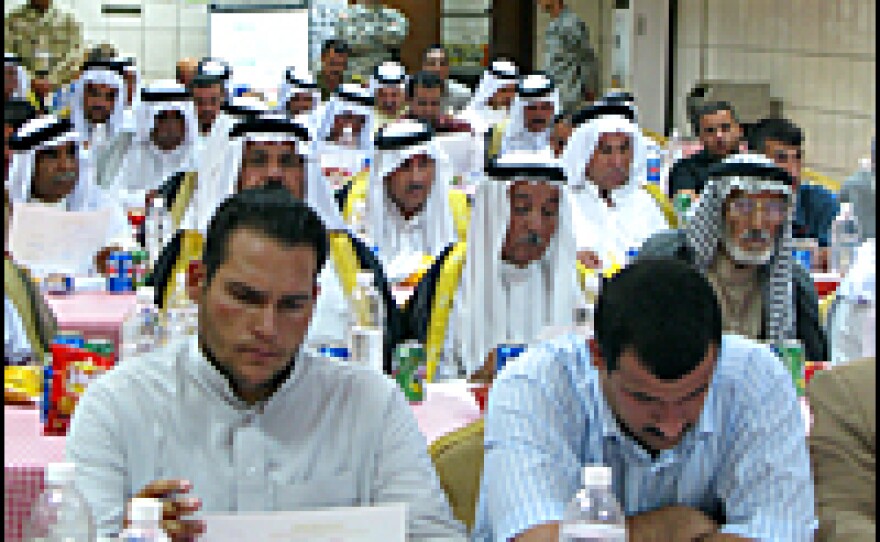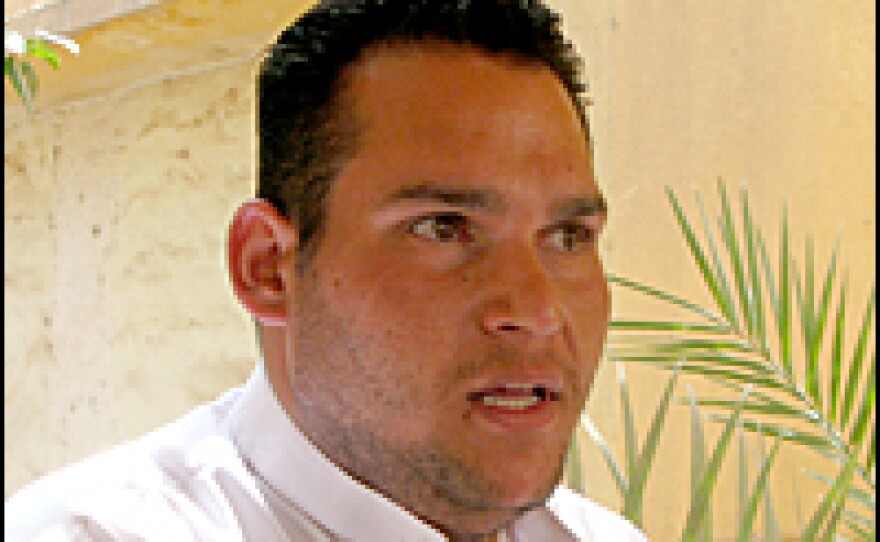

Iraq's Salahuddin province has been known for years as a violent stronghold of Sunni insurgents, including al-Qaida. But lately it has been relatively quiet. U.S. military units there say that's because former rebel fighters are turning themselves in by the hundreds — including some who had been the most virulently anti-American leaders.
One of the most prominent insurgents to come over to the American side is Mullah Nadhum al-Jubouri. Jubouri was a spokesman for the Islamic Army of Iraq, a Sunni insurgent group that was once closely allied with al-Qaida.
Guarded by a group of masked gunmen, the cleric called for holy war against the Americans and for the defense of Sunnis, a call that was widely understood to mean attacks against the Shiites.
Mullah Nadhum, now 30, doesn't deny his violent past, but he says militants took up weapons because they believed they were defending their country against the occupation. He says his group eventually broke with al-Qaida because it rejected al-Qaida's terrorist tactics of attacks against Iraqi civilians.
Mullah Nadhum now leads a U.S.-funded force that guards against al-Qaida and other insurgent groups. He says he threw his lot in with the Americans after he realized that Iraqi insurgents were being manipulated by Syria and Iran to create chaos in Iraq.
One reason that Mullah Nadhum has become an American ally is that the local American military commander, Lt. Col. Bob McCarthy, has set up a program that allows fighters to turn themselves in and "reconcile" with the Army. McCarthy's 1st Squadron, 32nd Cavalry unit of the 101st Airborne Division has lost five men in fighting with insurgents since January.
Gradual Process of Reconciliation
McCarthy's intelligence officer, Capt. Christian Wollenburg, says the reconciliation was a gradual process that started with word of mouth among local sheiks after McCarthy's unit and Iraqi army units made serious inroads against the insurgents.
He says that after the first few insurgents turned themselves in and found that they were treated fairly by the Americans, more came in. The unit and the court system in Balad worked out a formal plan for dealing with former militants.
If the insurgents are considered high-value targets and are wanted by the U.S., Wollenburg says they are warned that they will be arrested when they turn themselves in, but they are promised fair treatment.
If Iraqi authorities have warrants for the insurgents, the insurgents are given court dates when their cases will be heard by an investigating judge. Wollenburg says that of more than 500 fighters who have turned themselves in, about 170 have been given court dates.
Stressing that the process is just beginning, Wollenburg says more than two dozen former insurgents have been acquitted by a court in Balad. If the men are not wanted by the U.S. or the Iraqis, they can sign a cease-fire agreement and return to their homes as free men.
Wollenburg says the programs have several advantages for the U.S. military. For one thing, the soldiers are able to get identification for every man who comes in, including photos, fingerprints and retina scans. He says many of these men were never known to the military before.
Another payoff for the military comes in the form of information, an almost overwhelming amount, Wollenburg says — some new, and some confirming intelligence that soldiers have received in the past.
Building Trust in American Soldiers
Mullah Shakr al-Azzawi is another Sunni cleric who was part of the insurgency but now leads a local guard group funded by the U.S. Army. He says life for gunmen and their families was miserable because of constant pressure from U.S. and Iraqi forces. "If a woman was about to give birth," he says, "we couldn't even drive her to the hospital. It was too risky."
Mullah Shakr says that even so, he wouldn't have turned himself in if it were not for his trust in American soldiers as fair intermediaries. He acknowledges that he has been charged with two murders and a kidnapping, and he says he is relying on an American officer to go to court with him.
Mullah Nadhum says the main concern now is to assure former insurgents that they will get fair treatment if they turn themselves in. He says there have been allegations that some men who came in were mistreated, not in the local courts at Balad but in the higher Iraqi court at Tikrit.
Mullah Nadhum estimates that there are about 1,800 gunmen in the area around the town of Balad, and he says he believes that most of them will eventually reconcile.
Not everyone believes that the motives of all of the reconciling gunmen are pure, or that their hands are as clean of innocent blood as they say.
But as one Iraqi put it, "For now, everybody's trying to be an angel on Earth."
Copyright 2022 NPR. To see more, visit https://www.npr.org. 9(MDAzMjM2NDYzMDEyMzc1Njk5NjAxNzY3OQ001))






